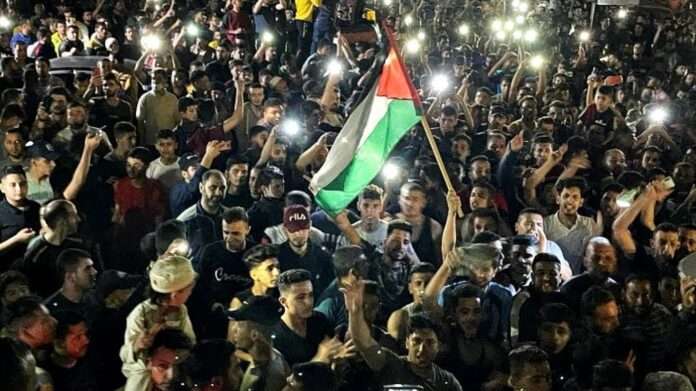Jerusalem: Israel and Hamas agreed to a ceasefire Thursday evening. The cease fire halted a bruising 11-day war that caused widespread destruction in the Gaza Strip. It also brought life in much of Israel to a standstill and left more than 200 people dead. At 2.00am local time, just as the ceasefire took effect, frenzy life returned to the streets of Gaza. People went out of their homes, some shouting ‘Allahu Akbar’ or whistling from balconies. Many fired in the air, celebrating the truce.
Like the three previous wars between the bitter enemies, the latest round of fighting ended inconclusively.
Israel claimed to inflict heavy damage on Hamas but once again was unable to halt the Islamic militant group’s nonstop rocket barrages.
Israeli Prime Minister Benjamin Netanyahu faced angry accusations after the ceasefire. It came from his hard-line, right-wing base that Netanyahu stopped the operation too soon.
Hamas, the Islamic militant group sworn to Israel’s destruction, also claimed victory. But it now faces the daunting challenge of rebuilding in a territory already suffering from poverty, widespread unemployment and a raging coronavirus outbreak.
Netanyahu’s office said his Security Cabinet had unanimously accepted an Egyptian cease-fire proposal. This decision was taken after recommendations from Israel’s military chief and other top security officials.
A statement boasted of ‘significant achievements in the operation, some of which are unprecedented’. It also included a veiled threat against Hamas. “The political leaders emphasised that the reality on the ground will determine the future of the campaign,” the statement said.
Also read: UN chief Antonio Guterres welcomes Israel-Hamas ceasefire
The fighting erupted May 10, when Hamas militants in Gaza fired long-range rockets toward Jerusalem. The barrage came after days of clashes between Palestinian protesters and Israeli police at the Al-Aqsa Mosque compound. Heavy-handed police tactics at the compound, built on a site holy to Muslims and Jews, and the threatened eviction of dozens of Palestinians by Jewish settlers had inflamed tensions.
The competing claims to Jerusalem lie at the heart of the Israeli-Palestinian conflict. They and have repeatedly triggered bouts of violence in the past.
Hamas and other militant groups fired over 4,000 rockets into Israel throughout the fighting. It launched the projectiles from civilian areas at Israeli cities. Dozens of projectiles flew as far north as Tel Aviv, which is Israel’s bustling commercial and cultural capital.
Israel, meanwhile, carried out hundreds of airstrikes targeting what it said was Hamas’ military infrastructure. At least 230 Palestinians were killed, including 65 children and 39 women, with 1,710 people wounded, according to the Gaza Health Ministry. Twelve people in Israel, including a five-year-old boy and 16-year-old girl, were killed.
The United States, Israel’s closest and most important ally, initially backed what it said was Israel’s right to self-defense against indiscriminate rocket fire. But as the fighting dragged on and the death toll mounted, the Americans increasingly pressured Israel to stop the offensive.
In a rare public rift, Netanyahu briefly rebuffed a public call Wednesday from President Joe Biden to wind things down. Netanyahu appeared determined to inflict maximum damage on Hamas in the war. He felt that could help save his political career. But late Thursday, Netanyahu’s office announced the ceasefire agreement. Hamas quickly followed suit.
Militants continued to launch sporadic rocket at Israel early Friday, before the 2 am ceasefire took effect.
In Washington, Biden hailed the cease-fire. “I believe we have a genuine opportunity to make progress, and I’m committed to working for it,” he said. Biden said the US was committed to helping Israel replenish its supply of interceptor missiles for its ‘Iron Dome’ rocket-defense system.
Netanyahu quickly came under heavy criticism from members of his hawkish, nationalist base. Gideon Saar, a former ally who now leads a small party opposed to the prime minister, called the cease-fire ‘embarrassing’.
Itamar Ben Gvir, head of the far-right Jewish Power party, tweeted that the ceasefire was ‘a grave surrender to terrorism and the dictates of Hamas’.
The cease-fire comes at a sensitive time for Netanyahu. In the wake of an inconclusive election in March, Netanyahu failed to form a majority coalition in parliament. His opponents now have until June 2 to form an alternative government of their own.
Meanwhile in Gaza, Hamas spokesman Abdelatif al-Qanou, said Israel’s announcement was a ‘declaration of defeat’. Nonetheless, the group said it ‘would honour the deal’.
Hamas and ‘Islamic Jihad’ said at least 20 of their fighters were killed. Israel said the number was at least 130 and probably higher.
Some 58,000 Palestinians fled their homes, many of them seeking shelter in crowded United Nations schools at a time of a coronavirus outbreak.
